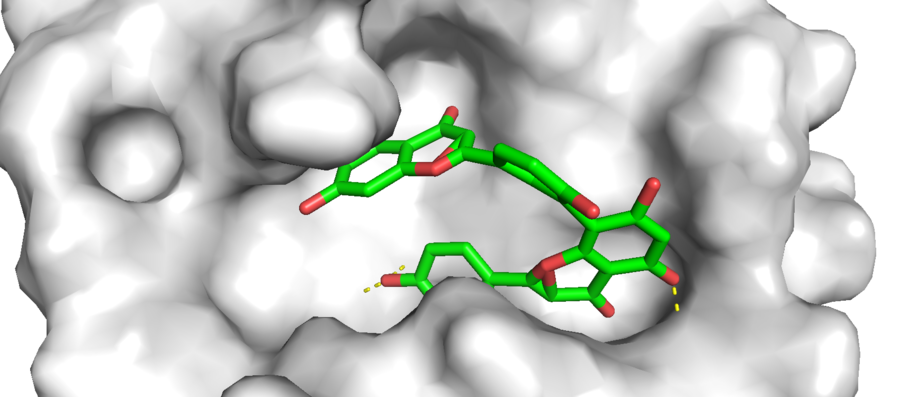A molecular dynamics study of 72 flavonoids indicates certain flavonoids inhibit the main protease of SARS-CoV-2, which is responsible for COVID-19 disease.
HOUSTON, TX, May 05, 2020 /Neptune100/ — A researcher at NXG Logic, LLC (www.nxglogic.com) recently completed a molecular dynamics study of 72 flavonoids found mostly in fruits and vegetables to identify which ones could potentially be used to treat COVID-19 disease. The findings are described in a preprint entitled “COVID-19 and Flavonoids: In Silico Molecular Dynamics Docking to the Active Catalytic Site of SARS-CoV and SARS-CoV-2 Main Protease” [Ref. 1], which is now undergoing peer-review for publication in a biomedical journal.
COVID-19 disease is caused by the newer form of the 2003 SARS-CoV virus, called SARS-CoV-2. Both variants of the virus are zoonotic, meaning they originated from animal sources. “While existing antivirals in current clinical trials may show efficacy for treating COVID-19 disease, it doesn’t mean their response can’t be improved through combined therapy with other drugs or natural compounds,” Peterson said. “There will always be a demand for new drugs to treat diseases related to new viruses, before vaccines are available.”
The goal was to find drugs that stick like glue in a special “pocket,” or active site, on the surface of a protein called 3CLpro, which COVID-19 uses to create numerous copies of itself inside infected cells of a patient. The 3CLpro protein is one of many proteins generated inside infected cells, and acts like a scissors to cleave larger proteins into smaller proteins used for constructing new copies of the virus, which then leave the cell to infect other cells. Therefore, researchers are trying to identify drugs that bind to this specific pocket to thwart replication of the virus, so that patient treatment can be improved.
Results indicated that the top 10 flavonoids were amentoflavone, gallocatechin gallate, diosmin, epigallocatechin gallate, hidrosmin, catechin gallate, elsamitrucin, pectolinaren, quercetin, and isoquercetin. Other flavonoids investigated with significant binding energies were hesperidin, rutin, rhoifolin, and peurarin. Many of the flavonoids identified have been reported in studies of in vitro laboratory-based inhibition of 3CLpro as well as in silico docking studies. Altogether, 14 flavonoids have now been identified in multiple studies: amentoflavone, daidzein, diosmin, epigallocatechin gallate, gallocatechin gallate, herbacetin, hesperidin, luteolin, naringin, peurarin, pectolinarin, quercetin, rhoifolin, and rutin. “This is terrific news, since it means that widely available natural flavonoids found in the common diet may have a role in minimizing the infection rate of SARS-CoV-2,” Peterson said.
Many of these flavonoids are available as supplements by themselves or are a component of a natural herb. Peterson said “The fastest way to incorporate one or more of the flavonoids identified into a clinical trial is to claim compassionate use, which accelerates the review process.” Existing antiviral trials could open an additional arm for which COVID-19 patients receive combination therapy based on Antiviral+Flavonoid(s). The primary outcome would be improved efficacy in the combined therapy arm vs. the single antiviral treatment arm — or other arms with a variety of doses. The hypothesis could be that the combined therapy shortens recovery times when compared with the antiviral used alone. New group sequential and adaptive clinical trials could also be rapidly initiated though compassionate use.
If flavonoids are found to show a synergistic effect when used in combination with an antiviral, then they could be consumed in moderation by the general public for prophylactic protection from SARS-CoV-2 infection. Peterson said “They’re already in the common diet and have been consumed for thousands of years, so safety should not be a major issue if used in moderation.” Peterson did say that grapefruit juice was a source of one of the flavonoids, which is known to negatively interact with many drugs, so its consumption should be evaluated by a primary care physician.
Disclaimer: The information provided is based on observations from scientific research and is not meant to serve as a medical recommendation. Readers should check with their physician for any issues related to their diet.
To speak with Leif Peterson, Ph.D., contact [email protected] For more information about NXG Logic, LLC, visit www.nxglogic.com
Reference
1. Peterson, LE. COVID-19 and Flavonoids: In Silico Molecular Dynamics Docking to the Active Catalytic Site of SARS-CoV and SARS-CoV-2 Main Protease. DOI: http://dx.doi.org/10.13140/RG.2.2.22294.50246 (May 4, 2020).
NXG Logic, LLC, develops scientific software for machine learning, AI, text mining, and statistical analysis.





